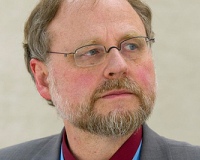Collective religious hatred ‘not natural’ says UN Rapporteur
by - 28th January 2014
 ATROCITIES in the name of religion are not ‘natural’ and do not just erupt ‘like a volcano’, but are the results of a string of exacerbating factors which can be avoided.
ATROCITIES in the name of religion are not ‘natural’ and do not just erupt ‘like a volcano’, but are the results of a string of exacerbating factors which can be avoided.
So says UN Special Rapporteur on religion, Heiner Bielefeldt, in his latest report to the Human Rights Council. Nation states must not just pay lip service to other religions, but must see ‘dialogue’ and communication as vital to combating mass atrocities based on religious hatred, he adds.
Special rapporteurs are titles given to people working on behalf of the UN, with a specific specialty or remit, designated by the United Nations Human Rights Council.
In an interview following publication of the latest report in December last year, Bielefeldt, a philosopher who has held the post for three years, told Lapido: ‘Many observers seem to assume that conflicts termed “religious” have their root causes in perpetual differences that are somewhat beyond any political influence. The opposite is true.’
He said that instead these conflicts arose because of ‘fear and contempt’, combined with aggravating factors such as ‘a lack of trust in the fair functioning of public institutions, a breakdown of meaningful inter-group communication and other political factors’.
Professor John Wolffe, Research Councils UK Global Uncertainties Leadership Fellow said the report was consistent with his own research on the roots of religious hatred.
It also accorded with a synthesis of current academic work which he is compiling on religion and security for the GU Programme.
‘Religious conflict is NOT inevitable, but rather the consequence of numerous contingent factors. The historical record provides numerous examples of peaceful coexistence between different faiths and cultures.
‘However, such coexistence can sometimes break down with alarming speed, and in the light of the real challenge of rebuilding trust once it has been destroyed, there is a pressing need for better understanding of potential risks. Prevention is much better than cure.’
Matthew Jones, public affairs team leader at charity CSW said all contexts differed.
‘We appreciate the fact that this report is saying that this is a real issue of serious concern and it needs to be tackled proactively.
‘We cannot just wait for a riot or mass atrocities to happen. We should be able to see the warning signs.’
He suggested that this approach could be taken in nations where a majority religion often lead to minority religions being persecuted, such as in the Buddhist-majority Myanmar, which has seen rising levels of violence in recent months.
Last week, the UN called for an investigation after 48 men, women and children from the minority Rohingya Muslim people were attacked and killed in Du Chee Yar Tan village in Rakhine state.
Under-Secretary-General for Humanitarian Affairs and UN Emergency Relief Coordinator Baroness Amos called on the government to take action and ‘to ensure the full protection of all civilians’.
Dialogue
Mr Bielefeldt stressed the important role that inter-religious dialogue and religious literacy played in reducing risk.
His report said: ‘Regular communication across religious boundaries is the most important precondition for fostering understanding and preventing or overcoming mistrust between religious or belief groups.
‘When conducted on an equal footing and in a sustained manner, that is, in ways that go beyond mere superficial brief encounters, interreligious communication can help replace stereotypes and prejudices by real experiences.’
Religious education was key, he told Lapido. ‘Religious education can help raise awareness that religions are not hermetic entities frozen against any meaningful change. Much depends on how believers interpret the sources of their religion or belief. Internal pluralism and diversity is usually much broader than we typically assume. We should learn to appreciate both inter-religious and intra-religious pluralism as a positive asset.’
But as the Department of Education continued its intransigence towards cuts in support for and training of RE teachers, Bieldefeldt urged governments to do their utmost to combat collective religious hatred.
The rapporteur said: ‘If it is true that collective hatred typically originates from combined sentiments of unreasonable fear and contempt, then it follows that policies of countering hatred must invest in trust-building based on universal respect for human dignity. ‘
Building trust with the purpose of overcoming unreasonable fears requires well-functioning public institutions, as well as activities that encourage and facilitate communication.’
The British Humanist Association said the report did not go far enough. Chief executive Andrew Copson said ‘legislation’ was key rather than trust-building exercises which might not have tangible effects.
He said: ‘Whilst the calls for such moves towards peace and reconciliation are always to be applauded, we must remember that whilst the foundations for such moves are being made, people around the world fall victim to religious and belief-based hatred on a daily basis.
‘While the report focuses on the development of trust between institutions, we must remember that on a short-term basis it is legislation that keeps people safe, and so the pursuit of effective legislation should be seen as an equal priority with the trust-building exercise the report recommends.’
- Log in to post comments
